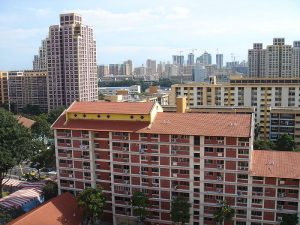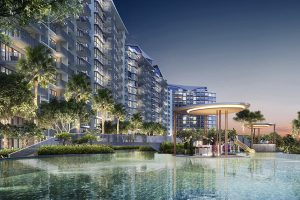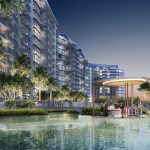Public housing prices rose by 5.0% in 2020, following the 0.1% increase in 2019

Public housing prices rose significantly despite the economy in the doldrums. The Minister for National Development gave the data today in response to a parliamentary question on trends of property prices in 2020 for HDB flats and the various types of private housing.
The Minister was asked what are the trends of property prices in 2020 for HDB flats and the various types of private housing, what are the reasons for the trends, and whether there are plans to address these trends.
Responding, the Minister said that both private and public housing prices have increased for three consecutive quarters since 2Q2020.
Table of Contents
“Public housing prices rose by 5.0% in 2020, following the 0.1% increase in 2019. This could be due to the stronger demand for resale HDB flats, as seen by the 4% increase in the resale transaction volume in 2020, as compared with 2019.
“Private housing prices rose by 2.2% in 2020, following the 2.7% increase in 2019. The price increase for private housing in 2020 was observed for both landed and non-landed properties. This similarly reflected healthy demand for private housing amongst Singaporeans.
“Overall, the demand for housing was likely to have been supported by the current low interest rate environment. However, prospective homebuyers should carefully consider their ability to service their mortgage obligations over many years, and not be attracted by low interest rates in the short term.”
The Minister said that given the negative impact on global economies and continuing labour market uncertainties as a result of the COVID-19 pandemic, prospective buyers should remain prudent in their property purchase and financing decisions.
He added that the Government will continue to monitor economic and property market conditions very closely, and will adjust its policies as necessary to maintain a stable and sustainable property market.
The spike in private and public housing prices may be curbed by ‘pre-emptive’ policy response believe some market watchers
Singapore’s biggest housing lender DBS is predicting that the government could introduce policies over the near term to keep check on the accelerating property price increase seen in recent months, despite the economy reporting a record recession year. Residential property prices in Singapore posted a strong performance in Q4 2020, rising 2.1% quarter-on-quarter, which brought the full year’s annual growth to 2.2%.
Among the potential policy tweaks market watchers are anticipating to the property price increase include changes to current loan quantum or additional buyer stamp duty rules.
Speaking at the BCA-REDAS Built Environment and Property Prospects Seminar in January, National Development Minister Desmond Lee said that his Ministry is committed to maintaining a stable and sustainable property market. Mr Lee said that a sustainable property market is important because it has a direct impact on Singaporeans as most of us own homes.
For the private housing market, the Government has put in place several measures over the years to try to ensure that prices move in line with economic fundamentals. This is to ensure that there is a sustainable property market which remains resilient to economic downturns, property bubbles and external shocks like a pandemic.
Mr Lee said that even in the midst of the pandemic and economic challenges, the property market has stayed generally resilient and we are starting to see some signs of renewed positive sentiments in the property market. But he noted that the pace of property price increase in private housing prices has gathered momentum since the second quarter of last year. Developers’ sales at recent project launches have been robust. With developers’ inventory of unsold units progressively coming down, there has been healthy bidding interest in recent Government Land Sales tenders.
He cautioned against unsustainable property price increase saying, “But we must remain vigilant. The property market is not insulated from ongoing uncertainties in the global economic outlook, nor setbacks to the recovery in the domestic labour market. Developers should continue to remain prudent in their land bidding and work with agents to market their projects responsibly to allow buyers to make considered decisions that take into account their needs and affordability.”
“Households in turn need to exercise caution in their property purchase decisions. Given the uncertain economic outlook and possible rises in interest rates, buyers should be mindful of their ability to service their mortgage obligations before making long-term financial commitments.”
The Government Mr Lee said “is monitoring the developments in the property market very closely” and will adjust its policies if necessary, to maintain a stable and sustainable property market for all Singaporeans.
 The Minister’s comments on the guarding against unsustainable property increase comes as the pace of growth in private housing prices has gathered momentum since the second quarter of 2020, with developers’ sales at recent project launches being robust.
The Minister’s comments on the guarding against unsustainable property increase comes as the pace of growth in private housing prices has gathered momentum since the second quarter of 2020, with developers’ sales at recent project launches being robust.
Mr Paul Ho, chief mortgage officer at iCompareLoan, said: “it is still difficult to see how 2021 will pan out for real estate in Singapore. It seems like the property price increase is running ahead of economic fundamentals, but a fresh round of curbs may be unnecessary if the market can correct itself.”
He added, “despite the property curbs introduced by the Government in the past few years, Singapore is still an attractive residential market for investors.”
“Those that want to buy or invest in properties should speak to a panel of real estate professionals as they can help you with affordability assessment and a promotional home loan. The services of such experts are free. Their analysis will give best home loan seekers better ease of mind on interest rate volatility and repayments.”
Although the property market exuberance has been curbed to some extent with the property cooling measures introduced in several rounds in the past few years, Singapore as a property market investment destination still remains among the top – shoulder to shoulder with other cities in the world like London, New York, Shanghai and Sydney.
“We have to be mindful that there is a lot of excess capital fluidity here and with interest rates at below 2%, Singapore has one of the lowest interest rates for home loans in the region,” he added.
The biggest gainers following the property cooling measures is likely be shophouses approved for commercial use. The property cooling measures affected almost all categories of buyers and is predicted to achieve its intended objectives of cooling demand and moderating price growth.
One report said investors looking for alternatives to park their money in the wake of property cooling measures, would divert their attention to commercial properties as they are not subjected to purchase or sales restrictions/encumbrances.





